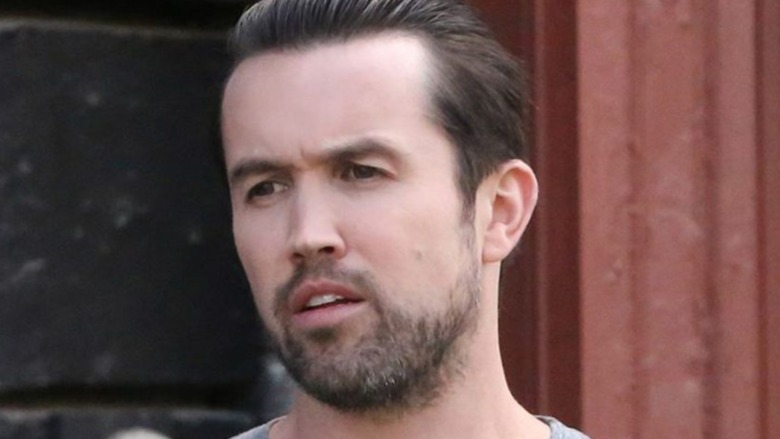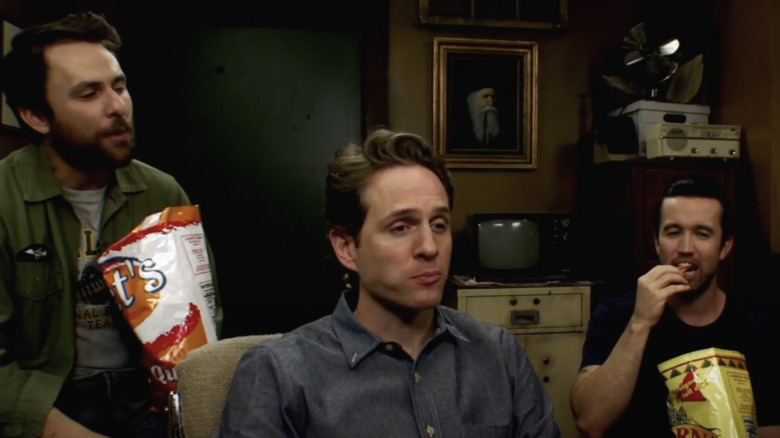The Fan Theory That Changes Everything On It's Always Sunny
Since its first episode aired in 2005, "It's Always Sunny in Philadelphia" has consistently shocked and offended viewers — but also made them double over in laughter at some of the most ridiculous plots in television, almost always ending in the main characters' punishment. Started by a close-knit cast that is heavily involved in the show's production, "It's Always Sunny" follows a group of unlikeable, sometimes creepy, often meanspirited characters who own a failing bar in South Philly. Many episodes explore the delusions of grandeur shared by Dennis (Glenn Howerton), Dee (Kaitlin Olson), Mac (Rob McElhenney), Charlie (Charlie Day), and Frank (Danny DeVito) in plots that devolve from the start. The gang is so fixated on their supposed talent and greatness that some consider them unreliable narrators who present themselves in the most favorable light possible, even as their schemes consistently highlight what terrible people they are.
If we understand "It's Always Sunny in Philadelphia" as told by unreliable narrators, the whole show becomes enshrouded in mystery. What is "real" within the logic of the series, and what is tainted by the self-serving presentation of the characters? Do the characters we see on screen actually look how they appear to us? Reddit user CraigsBenedict says no, and offers an interesting fan theory regarding how the show's finale might expose Dennis, Dee, and Mac.
The unreliable narrator theory of It's Always Sunny in Philadelphia
The Reddit post in question extrapolates the "unreliable narrator" theory all the way to a potential ending for the series. "In the final episode of Always Sunny, the bar will have to close and Frank will take a picture of Mac, Dennis and Dee for old time's sake," u/CraigsBenedict predicts. "Once the picture is shown, it is finally clear that all three of them look completely different from what we see as an audience. Mac has tiny arms, Dennis is not nearly as handsome as he thinks he is, and Dee still has severe back issues." Could this really be how the series concludes?
While the gang certainly is delusional about their excellence, there are a few problems with the unreliable narrator theory of "It's Always Sunny in Philadelphia." One potential issue is Mac's weight gain in Season 7. McElhenney gained 50 pounds before the show's 7th season to counter the trend in which sitcom actors get more fit and attractive as their shows gain popularity and they earn higher salaries. The joke of the season was not that Mac had gained weight but that he was so delusional about it, claiming in season's first episode that it was "mass" and "muscle" when the rest of the gang makes fun of him. Here, Mac is unsuccessful at covering up his perceived flaw. It could be argued, however, that because all of the gang — not just Mac — are the protagonists of the series, the unreliable narrative can still reflect the "truth" of his weight gain, as his influence on the story is outweighed by the rest of the gang's.
Even if Mac's weight can be explained away with this logic, the fan theory cannot account for some episodes so easily. For example, take the Season 12 episode "Old Lady House: A Situation Comedy," in which everyone in the gang is shown on film, looking just the same as they do in any other episode. This episode would directly contradict a finale in which a photograph reveals the gang's true appearances. These inconsistencies with the unreliable narrator theory do not necessarily prevent the eventual finale from taking this route — and the show has certainly taken its fair share of risks over the course of its 14 seasons, so anything is possible — but they do indicate that this ending will not have been planned from the start.
Problems with the theory aside, fans will have to wait quite a while to see if "It's Always Sunny in Philadelphia" will conclude with the revelation that Mac, Dennis, and Dee don't look how we think they do, as FX renewed the series for four more seasons late last year.

